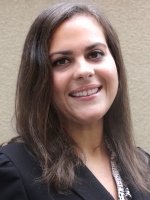BxD’s Colby Dillon featured this month in Northwestern Law’s “Ask An Alum” column
Bronx Defenders Criminal Defense Attorney Colby Dillon was featured this month in Northwestern University School of Law’s Children and Family Justice Center blog, Youth Matters, in their “Ask an Alum” column, speaking about her experience as a new public defender at The Bronx Defenders.
Colby (JD ’13) works as a juvenile attorney at The Bronx Defenders in New York City, where she is part of a team providing legal and social work services for youth and families in the neighborhood.
Q: What was the learning curve like as a young public defender?
A: I remember shadowing attorneys and going to different courtrooms to get to know the judges. It’s intimidating at first. You have to get over that quickly, because you want your client to have a lawyer who is confident and comfortable in front of a judge and a jury. So it definitely takes a second. But it’s a great opportunity and it’s important to be able to think on your feet really quickly. Being in court has helped me develop those skills significantly over the past year.
Q: Did the clinic experience help you handle so much courtroom time?
A: My very first experience was with a client named Mariela, when I represented her at a parole hearing. That was my first experience really appearing on behalf of a client in front a deciding body. That helped me to build my confidence, to learn what it feels like, how to prepare for those appearances. You go through many moots of the hearings, and going through that process, and including Mariela in that process and learning how to weave in a client’s story to represent a client is pretty integral to how I model my practice now.
Q: You have so many cases that it must be difficult to give each one the attention that you would like. How do you handle that kind of caseload?
A: It’s an emotionally difficult job. I’m emotionally invested in all of my clients. When things don’t go the way I think they should for a client, it’s hard. It’s really hard. I’ve learned to rely on my colleagues for support and people outside of work to help me redefine what a success is in a case. I learned that very early on [at the clinic] and it really helped me here, to redefine what a win is, exactly. A win doesn’t necessarily mean a not guilty verdict. It could mean getting a deposition for a client that had an issue with housing. It may not be a “not guilty” but that deposition may be the best thing for them.
Q: What do you do to stay energized as a public defender?
A: I do a lot of yoga (laughs) and I run a lot of races. Those activities keep me active, physically, and gives me a short reprieve from the stress of the job. Running allows me to hit the reset button, and then back to the job. It helps me approach my cases with a clearer mind.
Q: Why are you tied to juvenile justice and social justice work?
A: It’s something that I’ve basically been raised with. My dad is a public defender, and for a time my mom worked in the community with people with disabilities. I was introduced to it at a very young age and became more passionate about it when I went to college, and just began exploring inequalities in every way. The criminal justice system, economic inequality, gender inequality. I think a lot of people learn about these issues but don’t necessarily act on them. And I think it’s great to for people to learn about these issues and get upset about them, but what’s even better is to turn that anger into action. That’s how I ended up in this career.
To read the original interview click here.

